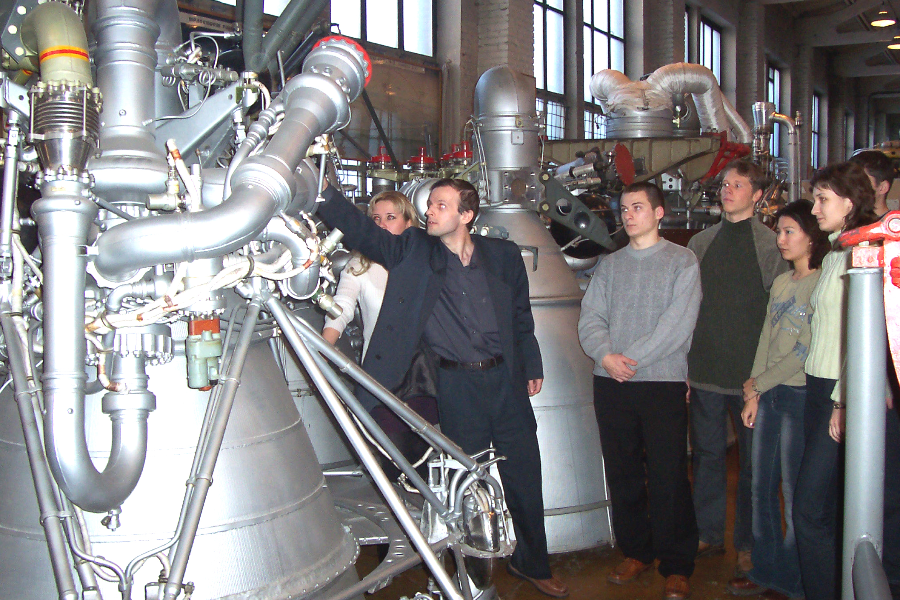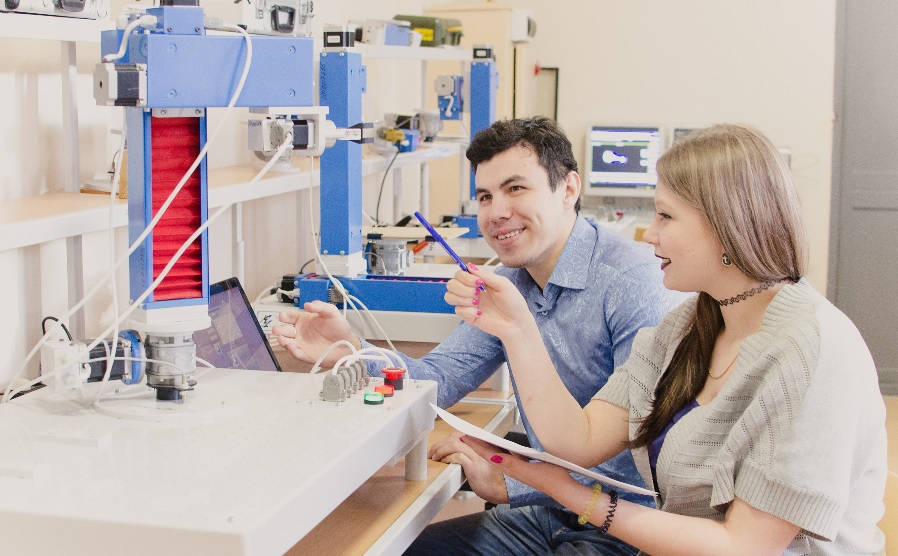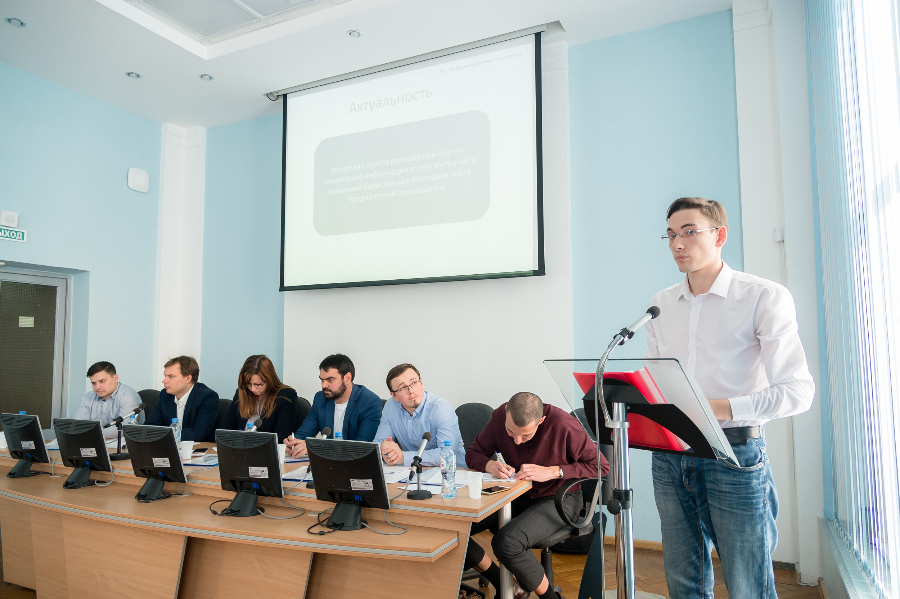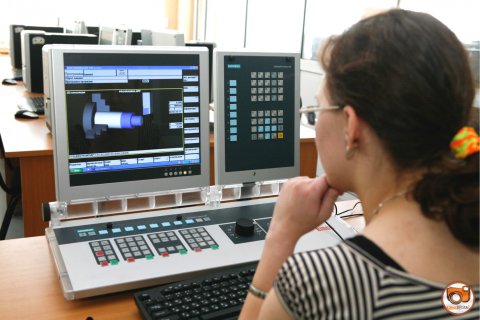Do you want to learn how to create new materials and alloys, excellent cars, powerful all-terrain vehicles and racing cars, fast planes and rockets, control the energy flows that feed cities and factories? Do you want to become a high-class engineer who is in demand in the labour market? Then your choice is the Institute of Engineering and Technology of South Ural State University, which is headed by Doctor of Sciences (Engineering), Professor Sergei Vaulin.
History and the Present
The SUSU Institute of Engineering and Technology carries on the glorious traditions of the Chelyabinsk Polytechnic Institute, which had a high level of specialist training and was distinguished by its significant ongoing research. Today, the SUSU Institute of Engineering and Technology is an integrated scientific and educational centre specializing in design engineering for the leading fields of the industry: metallurgy, mechanic engineering, energy, transport and the aerospace industry. Five well-known faculties, the history of which goes back many decades, carry out design engineering in the following priority strategic fields according to the federal plan for the implementation of the Technet National Technology Initiative: Automobile and Tractor Engineering Faculty – Avtonet: "Energy-efficient Engines and Smart Transport"; Faculty of Aerospace Engineering – Aeronet: "Rocket and Space Equipment and Aerospace Technologies"; Faculty of Materials Science and Metallurgy Engineering –"New Materials and Digital Technologies of Metallurgical Production"; Faculty of Mechanical Engineering – "Digital Technologies and Robotic Technological Systems in Mechanical Engineering”; Faculty of Energy and Power Engineering - Energynet: "Digital Distributed Power Generation and Intelligent Electric Drive."

Scientists, teachers, specialists of faculties and departments work together in cross-functional teams on various big cross-disciplinary projects of the university in the fields of Digital Industry, Materials Science, Ecology, Space and Rocket Technology, as well as on the Smart City project.
Pluses for Applicants
The main criteria when choosing a place of study are, of course, the quality of educational programmes, the level of qualifications of teaching staff, technical equipment, living conditions and the quality of the environment in which the university is located. According to all these criteria, the Institute of Engineering and Technology occupies a leading position. Here, unique scientific equipment is used in the educational process: for example, the Aerospace Engineering Research and Education Centre has a complex for studying dynamic characteristics and virtual testing of structures and systems of aerospace engineering. The Experimental Mechanics Research and Education Centre is equipped with a learning management system (LMS™) complex by Siemens PLM Software for cross-disciplinary 3D modelling and virtual testing. The Mechanic Engineering Research and Education Centre has advanced multi-axis machining centres with numerical control from various manufacturing countries.
Today, over 2000 students from 52 countries are studying at SUSU in various majors and programmes. A significant part of them study at the Institute of Engineering and Technology. And this is not surprising: here, the most comfortable conditions for living and studying are created for foreigners. The flexibility of the educational model is manifested in the fact that at the request of students with sufficient language training after graduating from the Preparatory Department, they have the opportunity to go on to master the basic educational programmes both in Russian and in English.

The SUSU Institute of Engineering and Technology supports talented freshmen with scholarships that are paid during the first semester to those who entered with high scores in the Unified State Examination, to winners and prize-winners of Olympiads admitted without exams, as well as to winners of the Zvezda (Star) Multidisciplinary Engineering Olympiad admitted on common bases. And after they pass the first session, students have a chance to qualify for more than three dozen different types of scholarships. The most successful and talented students can count on several scholarships at once.
But for students, an institute is more than just a "knowledge factory". Former schoolchildren spend most of their time here. They grow up and develop their personality at this place, but still lectures and laboratory research, even of the highest level, are not enough for the harmonious development. Moreover, there is always room for festivities in the life of the Institute. For freshmen, Matriculation Ceremony is organized. The Days of the Institute of Engineering and Technology, as well as the competition called Institute of Engineering and Technology: The Best of the Best have become a good tradition. On the whole, students have a very busy life, young people always have something to do. For example, a volunteer movement is developed here, where the guys provide real help to people and enjoy this immensely. Of course, various meetings, seminars, conferences are held, too...
Cosy dormitories, Health Centre, Student Sport Complex, student cafes and canteen, Business Cooperation Centre await students on campus – everything is just around the corner from Alma Mater. Summer vacations can be fun and spent with benefit at the Olimp Sports and Recreation Camp.
Knowledge Provided by World-famous Scientists
As one of the main structures of SUSU, the Institute of Engineering and Technology has firmly entered the world educational space, which is reflected in its standing in the world QS and THE rankings. In particular, the position of SUSU in the ranking of THE Engineering & Technology last year was determined by its inclusion in the group of world universities of the echelon of 601–800 (out of the total number of universities in the world, 25000). This is a fairly high position for the university, which has relatively recently appeared with its program at the international level. This level, among other things, is determined by close contacts with leading scientists of domestic and foreign universities. At present, about 60 such academics give lectures at the Institute of Engineering and Technology, conducting practical classes and participating in the research. Among them are such well-known specialists as the president of SMS Group holding, Honorary Professor of SUSU Pino Tese, Germany; Professor of the National School of Engineers of Saint-Etienne (ENISE) Philippe Andre Francois Bertrand, France.

In turn, the academic staff from the Institute of Engineering and Technology also work at world's leading universities from time to time. For example, Professor Sergei Sapozhnikov teaches courses at the Catholic University of Leuven, Belgium, and is a member of the Thesis Board of this famous European university.
A Breeding Ground for Engineering Personnel: The Elite of Engineering Education
The SUSU Institute of Engineering and Technology is a brand based on three quarters of a century of successful training of engineering personnel and the implementation of significant scientific and technical projects. During this time, world-class scientific schools and laboratories have been formed in the field of Engine Building and Transport, Rocket Technology, Materials Science and Metallurgical Technologies, Mechanical Engineering Technology and Computer-assisted Technological Equipment, Electric Drives, Alternative Energy and Conventional Energy Systems. This brought the Institute of Engineering and Technology well-deserved fame and allowed it to take a leading position.
The educational process here is conducted in a different way, taking into account the students' aptitudes and abilities. Motivated guys with high Unified State Examination scores have the opportunity to enter the elite training zone and to work with leading professors on trend issues in the industries from the very first year of studies. Further, when studying special disciplines, students have the opportunity to enter the zone of project-based learning, which is based on participation in "adult" projects. It is namely the trend and cross-disciplinary projects of polytechnic scientists that the young researchers, students of project-based learning, and even schoolchildren are involved in, each at their own level of training. Youth engineering bureaus are gaining more and more popularity at the Institute of Engineering and Technology, where practical experience can be gained by working on significant projects, including spacecraft for landing on asteroids, electric race car, traffic control system for a "smart city", additive metallurgical technologies, precise industrial robotics, smart electric drive, and smart digital power systems.
Smart Students of the Institute of Engineering and Technology
Not a single program or competition is complete without the students of the Institute of Engineering and Technology. In particular, many of them win the competition of the UMNIK Innovation Assistance Fund, aimed at supporting commercially oriented scientific and technical projects of young researchers. The award to the winners is a grant in the amount of half a million roubles for the implementation of their projects.
Students' successes are reflected in their publications in English in international journals, including those listed in the first quartile of world rankings. Students register patents for inventions, participate in Russian and international conferences, go on internships. Graduates, who have undergone project-based learning, now work at leading enterprises for which projects were carried out, in particular, at the Vostochny Cosmodrome.
Here are the names of only a few of the winners of the UMNIK competition.

In the field of New Materials and Chemical Technologies, among the winners are the following representatives of the Faculty of Materials Science and Metallurgy Engineering: senior lecturer at the Department of Materials Science and Physico-Chemistry of Materials Aleksandr Chernukha with the project entitled Development of Material for Hydrogen Energy Based on Molecularly Doped Carbon Nitride; graduate student Vadim Sedukhin with the project called Development of Technology for Deeper Refining from Non-metallic Inclusions with Argon Blowing in Ladle; graduate student Iuliia Latfulina with the project called Development and Creation of New Carbon-based Powder Composite Materials to Obtain Structural Products for New-generation Transport and Space Technology; graduate of the Faculty of Materials Science and Metallurgy Engineering, engineer Sergei Faizov with the project entitled Development of Resource-saving Technology for the Manufacture of Low-temperature Lead-free Solid Wire Solder.
In the field of New Instruments and Intelligent Manufacturing Technologies, grants were received by: an engineer-researcher of the Department of Aircrafts Aleksei Krivonogov with the project entitled Development of a Multiphase Passive Acoustic Clamp-on Flow Meter Based on the Hypothesis of "Frozen Turbulence" and Computer Simulation with the Vortex Flow Optimization System; postgraduate of the Department of Automated Engineering Technologies Ivan Cherepkov with the project on the Development of a Competitive Technology for Forming Holes for Carving in Thin-sheet Blanks; postgraduate of the Department of Technology of Automated Production Aleksandr Nikonov with the project called Development of Thread Cutting Technology in Blanks of Fibre-reinforced Composite Materials; postgraduate of the Department of Automated Engineering Technology Anton Baev with the project on the Development of an Effective Technology for Shaping by Milling of Non-technological Internal Surfaces of Foundry Moulds; postgraduate of the Department of Automated Engineering Technologies Anton Kazanskii with the project entitled Development of the Manufacturing Technology of a Part by a Hybrid Additive-Casting Method.
In the field of Resource-saving Energy, the following participants became the winners: a lecturer at the Department of Industrial Heat and Power Engineering Iurii Prikhodko with the project on the Development of an Algorithm for Monitoring the State of a Building’s Heat Network Taking into Account the Specifics of Practical Aspects of Regulating Heating Systems; postgraduate of the Department of Aircrafts Evgenii Solomin, who is the author of the project called Development of an Experimental Prototype and Organization of Production of the System Preventing Frost Formation; postgraduate of the Department of Industrial Heat and Power Engineering Sulpan Kuskarbekova with the project entitled Development of a Once-through Steam Generator of a Coiled Type with Increased Accumulating Capacity and Burning Liquid Fuel for the Far North Regions; student of the Department of Automated Electric Drive Kseniia Semenova, who presented the project on the Development of a Super-flywheel for a Wind Power Installation as an Energy Storage Device.
New Centres and Laboratories
In 2019, at the meeting of the International Scientific Council, a decision was made to open research laboratories under the guidance of leading world scientists.
The first one of these was the Laboratory of Magnetic Oxide Materials. The head is Doctor of Sciences (Physics and Mathematics), Professor Vladimir Gudkov (UrFU, Yekaterinburg); the head on behalf of SUSU is Doctor of Sciences (Chemistry), Associate Professor Denis Vinnik. It was followed by a Laboratory of Polycyclic Aromatic Compounds and Carbon Nanomaterials, the head of which is Doctor of Sciences (Physics and Mathematics), Professor Konstantin Amsharov (Halle-Wittenberg University named after Martin Luther, Germany); the head of behalf of SUSU is Candidate of Sciences (Chemistry) Dmitry Zherebtsov.

In November 2016, in the first wave of the opening of international laboratories on the recommendation of the International Scientific Council, a Laboratory of Mechanics, Laser Processes and Digital Production Technologies appeared at the Institute of Engineering and Technology under the guidance of the above-mentioned prominent French scientist Philippe Bertrand and headed on behalf of SUSU by Doctor of Sciences (Engineering), Associate Professor Marina Samodurova.
Most Important Projects of the Institute of Engineering and Technology
In 2019, scientists from the Institute of Engineering and Technology submitted the total of 197 applications for participation in competitions held by the Russian Science Foundation, the Russian Foundation for Basic Research, leading enterprises of Russia, as well as, the Federal Target Program organized within the framework of Decrees No. 218 and 220 by the Government of the Russian Federation entitled Research and Development in Priority Fields for the Development of the Scientific and Technological Complex of Russia for 2014–2020. Among the winners were 29 applications. Here are just a few of them.

According to the results of the competition held by the Russian Foundation for Basic Research, the research work headed by Professor Gennadii Mikhailov under the title Research and Development of the Progressive Technology of Microwave Waelz-oxide Calcination was recognized as the best; the research work headed by Professor Irina Kirpichnikova entitled A Fundamental Study of the Synergistic Effect of Combining the Discrete Structure (Double Gearing) of Direct-driven Valve-inductor Electric Drives of Spherical Positional Parallel Manipulators with a Multi-parameter Extreme Control System and Its Effect on the Energy Efficiency of Solar Tracking Systems (with the Prospect of Using in Position-tracking Systems of Other Classes). Also among the winners are the projects: Development of New Methods for Detecting and Managing Local Impact Damage to Aircraft Structures Made of Polymer Composite Materials headed by Professor Sergei Sapozhnikov; Theoretical Justification and Experimental Studies of a New Method for Controlling the Orientation of the Rotor of a Horizontal-axis Wind Power Installation headed by Professor Evgenii Solomin; Studying the Process and Results of Growing Barium Hexaferrite from Melted Single Crystals Doped with Two Elements, and the project on the Correlation of the Features of Crystal Structure and Magnetic Characteristics in Single Crystals and Ceramic Samples of M-type Hexaferrites with Heterovalent Diamagnetic Substitution, both headed by Associate Professor Denis Vinnik.
The following research works won in the competition organized by the Russian Science Foundation: Creation and Research of Highly Entropic Phases with Perovskite Structure under the guidance of Svetlana Gudkova in the category Research by Scientific Groups Conducted by Young Scientists; Gradient Substitution of Iron Atom in Crystalline Structures Based on M-type Hexaferrites under the guidance of Vladimir Zhivulin in the category Initiative Research by Young Scientists.
Among the works under the Decree No. 218, the joint project with the Ural Engineering Centre under the title Creation of a High-tech Production of Hydraulic Drives with a Wide Range of Hydrostatic Guideways with Low Resistance to Movement of Moving Parts and an Increased Resource for Bench-scale Testing Equipment headed by Professor Dmitry Ardashev was highlighted.
A grant was also won to carry out a state assignment for research work on the development and updating of transport planning documents in the territory of the Chelyabinsk agglomeration by order of the Government of the Chelyabinsk Region and the regional Ministry of Transport. The supervisor is Nikolai Goriaev.
Collaboration with Key Partners
Among the many universities and organisations, with which the Institute of Engineering and Technology interacts, including on the issues of science and education, are the Oktiabr Production Association; the Scientific and Production Association of Automatics named after academician N.A. Semikhatov; All-Russian Research Institute of Experimental Physics named after Academician E.I. Zababakhin of the Russian Federal Nuclear Centre; Elektromashina Scientific and Production Association; Ural Branch of the Russian Academy of Sciences; Belarusian Academy of Sciences; Leuven University, Belgium; Institute of Polymer Mechanics of the University of Latvia; State Missile Centre named after V.P. Makeev; Research and Development Institute of Mechanical Engineering, Nizhnyaya Salda; Ural Scientific and Production Association; and Ural Engineering Centre.
The cooperation in the fields of tribology and internal combustion engines with the Ishlinsky Institute for Problems in Mechanics of the Russian Academy of Sciences, the Laboratory of Mechanics of Sofia University, the Austrian Centre of Competence in Tribology (AC2T research GmbH) is worth special mention as well.
The Institute of Engineering and Technology is also actively involved in the creation of the Advanced Industrial Technologies and Materials Ural Interregional Scientific and Educational Centre. The university has proposed a number of research projects, each of which is supported by an industrial partner. This indicates interest in the results of the research and experimental development.
Practical Training and Employment
Practical training as an element of the educational process is necessary to consolidate and expand the knowledge gained during theoretical training; to acquire the necessary practical skills in the work in the specialty in a real production environment; to master advanced methods of technology; and to gain new competencies. Practical training allows students to assess the level of their competences and determine the need for their adjustment in the learning process. The priority requirement of potential employers is the professional competence of the employee.
.jpg)
The Institute’s long-term partnerships make it possible to undertake internships, as a rule, with further employment at the country's leading enterprises in various regions: Moscow, Kaliningrad, Chelyabinsk regions, Khanty-Mansi Autonomous District, the Krasnodar Territory and the Republic of Crimea. The Institute of Engineering and Technology is rightly proud of the fact that its graduates are in demand and are competitive in the modern labour market.
Unified State Examination and State-Funded Admission
Information on the availability of state-funded places for certain specialties, and on which exams should be passed as part of the Unified State Examination can be found at https://abit.susu.ru/spec/pp_bso.php.
For all questions, applicants can contact the Dean's Office of the chosen faculty.
- Automobile and Tractor Engineering Faculty: Dean's Office – (351) 267-94-51, Executive Secretary of the Admissions Committee Pavel Baranov – 8-908-064-56-65;
- Faculty of Aerospace Engineering: Dean's Office – (351) 267-91-22, Executive Secretary of the Admissions Committee Iuliia Baranovskaia – 8-908-708-48-34;
- Faculty of Materials Science and Metallurgical Technologies: Dean's Office – (351) 267-92-21, Executive Secretary of the Admissions Committee Ivan Ilyin – 8-904-977-80-17;
- Faculty of Mechanical Engineering: Dean's Office – (351) 267-94-80, Executive Secretary of the Admissions Committee Liliia Ishmaeva – 8-919-312-00-14;
- Faculty of Energy and Power Engineering: Dean's Office – (351) 267-92-51, Executive Secretary of the Admissions Committee Natalia Averina – 8-908-062-65-17;
- Part-Time Studies: Dean's Office – (351) 265-64-80, 267-91-63, Executive Secretary of the Admissions Committee Aleksandr Ponkin – 8-951-464-67-08.




